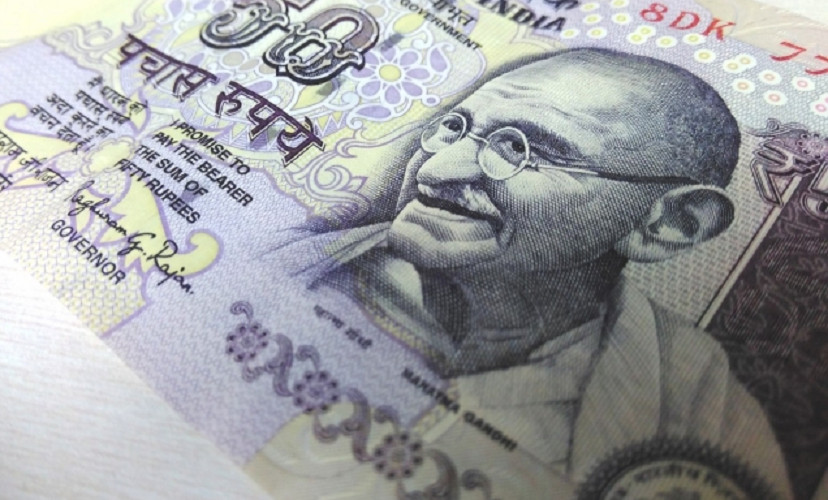

 16.11.2022 11:31 PM
16.11.2022 11:31 PMThe Indian rupee continues to weaken as demand from exporting companies pushes the dollar higher. The weakness in Asian equities and currencies has now spilled over into domestic markets.
Data released by India's statistics authority showed India's merchandise trade deficit widened to $26.91 billion in October. The drawdown was more than $1 billion in net revenue, compared to $25.71 billion in September.
India's merchandise exports fell by almost $6 billion to $29.78 billion from $35.45 billion in the previous month, while imports fell to $56.69 billion from $61.16 billion in the same period.
The reasons are not only global economic problems, but above all crop failure due to heavy rainfall during the harvest period. The crop failure reached domestic markets, affecting the cost of basic food products - flour, legumes. After grain, meat, eggs and milk also become more expensive. Basic foodstuffs form the basis of household expenditures in the country.
Amid the news, the rupee fell 0.25% to 81.2975 per dollar. The currency lost almost a percentage of its high of 80.51 on Monday, partly due to volatility in the Asian market.
The huge demand for cash dollars in both the spot and forward markets is spurring the fall. Of course, foreign banks also buy on behalf of their importing clients.
At the same time, the decline in USD/INR forward premiums made importers attractive to hedgers, which led to an increase in dollar outflows. The cost of hedging the 6-month dollar is down 25 basis points this week.
As a result, for the day the dollar index fell by 0.3% after the initial increase. There is hope that the currency will bounce back postmarket as US President Joe Biden reassured the international community by saying that the missile that caused the explosion in NATO member Poland may not have been fired from Russia.
However, the excitement peaked in the early Asian session. As a result, Asian equities and currencies remained volatile, with the Chinese yuan and equities down 0.5% each.
Concerns about a rise in COVID-19 cases in the major cities of Guangzhou, Beijing and Zhengzhou also played a role.
The recent turmoil in the currency markets has also left investors wondering which way the Indian currency will move. With the expected recession in developed markets hitting global trade, some believe the dollar will bounce back and put pressure on Asian currencies. This is a realistic option, at least during the early recession. The dollar rally is far from over, and it makes sense to keep the rupee forecast at 83.50 and 84-85 by the end of December and the end of March, respectively. At least it is not noticeable that the Federal Reserve will stop in the short term, so it is only natural to expect a resumption of the dollar rally.
傑羅姆·鮑威爾的最新言論引發美國股票急劇拋售。在聯邦儲備主席表示利率可能在年底前保持不變後,標普500指數和那斯達克均出現大幅下跌。
華爾街在本次交易日收盤下跌。波音和強生這些巨頭的股票受到最大的打擊,因為關於關稅政策的不確定性持續影響投資者情緒。
特朗普政府做出了一些讓步:對電子產品的關稅已暫時取消,並正在考慮對汽車行業放寬條件。這些舉措引發了積極反應,標準普爾500指數上漲。
在美國總統唐納·川普(Trump)宣布取消對電腦和智慧手機的關稅後,美國股市應聲上漲。這一決定尤其對蘋果等公司起到了強勁的推動作用,使得主要指數普遍反彈。
歐洲股市在新的一周以積極的姿态开始,泛歐STOXX 600指數在早盤07:09 GMT時漲1.6%。接连三周下跌后,主要由全球關稅紛爭引發。
外汇图表
网页版
Your IP address shows that you are currently located in the USA. If you are a resident of the United States, you are prohibited from using the services of InstaFintech Group including online trading, online transfers, deposit/withdrawal of funds, etc.
If you think you are seeing this message by mistake and your location is not the US, kindly proceed to the website. Otherwise, you must leave the website in order to comply with government restrictions.
Why does your IP address show your location as the USA?
Please confirm whether you are a US resident or not by clicking the relevant button below. If you choose the wrong option, being a US resident, you will not be able to open an account with InstaTrade anyway.
We are sorry for any inconvenience caused by this message.

